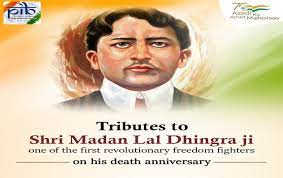56th death anniversary of Savarkar observed in Maharashtra

56th death anniversary of Savarkar observed in Maharashtra: Yesterday marked the 56th death anniversary of Vinayak Damodar Savarkar, also known as Veer Savarkar, a renowned revolutionary and independence fighter. The state’s governor, Ramesh Bais, the chief minister, Eknath Shinde, and the deputy chief minister, Devendra Fadnavis, honoured the renowned social reformer.
February 2023 Current Affairs Quiz
In his address, CM Shinde praised Savarkar as a great revolutionary, a sincere patriot, a persuasive speaker, a talented author, and a social reformer. Fadnavis said on Twitter that Savarkar was a brilliant revolutionary, a devoted patriot, and a true worshipper of the goddess of freedom. Sanjay Raut, the leader of the Uddhav Thackeray faction, referred to Veer Savarkar as a Maharashtrian legend and the valiant son of the state. Mr. Raut requested that the Bharat Ratna be bestowed upon Savarkar by the Central Government. On May 28, 1883, Vinayak Damodar Savarkar was born in the Maharashtrian village of Bhagur in the Nashik district. He died on February 26, 1966, in Bombay.
Facts about Vinayak Damodar Savarkar
When Veer Savarkar was a teenager, he founded the Mitra Mela youth group. This organisation was founded to promote radical ideas. He has been a supporter of Hindutva since he was a child. Savarkar organised a march with his schoolmates when he was 12 years old to destroy a mosque as retaliation for Muslim “atrocities” done against Hindus. While studying for his B.A. at Pune’s Fergusson College, he was inspired to boycott British products by Lokmanya Tilak’s call. On October 7, 1905, during Dussehra, Savarkar built a bonfire and set fire to everything he had brought from abroad.
In 1909, Savarkar was detained on suspicion of planning an armed uprising against the Morley-Minto reform. He dove into the water to try to escape, but he was caught. He received two life sentences, or 50 years each, in the Andamans Cellular Jail, popularly known as Kala Pani, in 1911. Savarkar is frequently accused of being a “traitor” because he begged the British government for forgiveness while in the Andaman Islands. Savarkar was released from prison in 1924 on the strict condition that he not engage in politics for the next five years.
The British government outlawed many of Savarkar’s books or those that were based on them, including “The Indian War of Independence of 1857.” The Marathi edition of the book was prohibited even before it was published since it was seen to be quite provocative. Savarkar did not revere cows. Care for cows, not worship them, he advised his followers. He also accepted vegetarianism with no reservations, unlike many Brahmins of the time. When young Mohandas Karamchand Gandhi visited the India House in London, where Savarkar and other revolutionaries resided, in 1906, he first got to know the man.
Savarkar urged “every true Indian” to make the mental decision to free themselves of the “seven fetters.” Vedoktabandi (exclusive access to Vedic literature), Vyavasayabandi (continuation of a profession by virtue of one’s birth), Sparshabandi (untouchability practises), Samudrabandi (forbidding the crossing of seas to travel to foreign lands), Shuddhibandi (forbidding reconversions to Hinduism), Rotibandi (inter-caste dining), and Betibandi were some of these (rigidity in abolishing inter-caste marriage). Freedom fighter Bhagat Singh referred to Savarkar as a “braveheart.” In 1924, Singh’s piece “Vishwa Prem” was published in a Hindi monthly published in Calcutta.
Savarkar was charged with the murder of Mahatma Gandhi, but he was later cleared because no proof of his involvement was found. Savarkar believed his life’s work was complete in 1964 when India attained independence and it was time to depart. He declared his intention to achieve samadhi and began a hunger strike on February 1, 1966. He died on February 26, 1966. Savarkar was referred to as the “remarkable son of India” by the late former prime minister Indira Gandhi. Her government also released a postage stamp in Savarkar’s honour in 1970. In 2002, the airport in Port Blair, the capital of Andaman and Nicobar, was renamed “Veer Savarkar International Airport.”